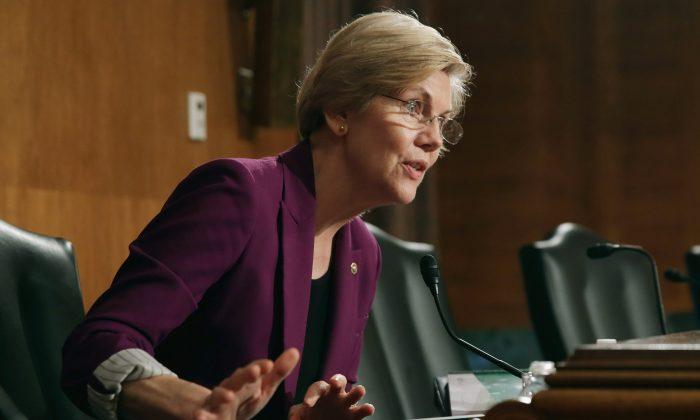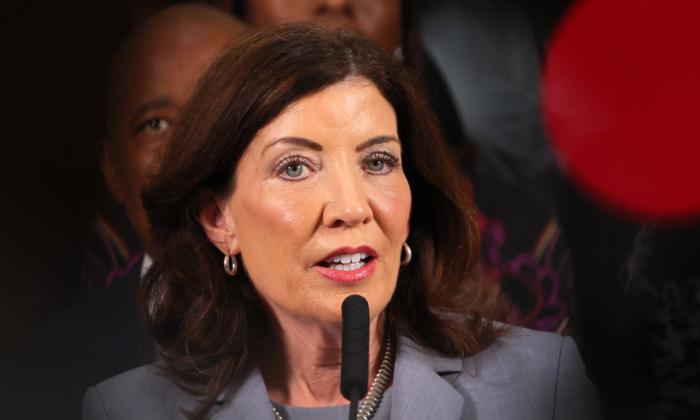Economists and experts warned a Senate committee hearing this week that the U.S. government is close to disaster on the federal debt ceiling.
The five panelists invited to speak included Mark Zandi, chief economist at Moody’s Analytics; Anat Weisenfreund, director of Head Start and Early Learning Programs at Community Action Pioneer Valley; Douglas Holtz-Eakin, president of the American Action Forum; Michael R. Strain, director of economic policy studies and Arthur F. Burns scholar in political economy, American Enterprise Institute; and Amy K. Matsui, senior counsel and director of income security at the National Women’s Law Center.
Senators Elizabeth Warren (D-Mass.), chairwoman of the Economic Policy subcommittee, and John Kennedy (R-La.), the subcommittee ranking member, were joined by senators Bob Menendez (D-N.J.) and Chris Van Hollen (D-Md.) to conduct the hearing.
The panelists unanimously agreed that Congress should quickly raise the debt limit, as a last-minute move may cause uncertain global markets to stumble and credit default swaps on U.S. government bonds to hit volatile levels.
The congressional deadlock could also weaken the nation’s credit rating as time goes on.
House Republicans have urged the Biden administration and the Democrats to reduce federal expenditures and make efforts to cut the U.S. debt that is more than $34 trillion before any compromise on the ceiling can be reached.
The outgoing Democrat House majority pushed last-minute legislation in December to raise the debt limit by $2.5 trillion, but the government hit its $31.4 trillion ceiling on Jan. 19.
This forced the Treasury Department to use extraordinary measures, in which the department pays the nation’s bills in time through various accounting maneuvers to avoid defaulting on the debt and to buy more time for Congress to raise the limit.
Senate Subcommittee Members Agree to Oppose Government Default
Sen. Warren opened the hearing with an attack on the GOP-controlled House, accusing them of not being “concerned about the debt ceiling deadline,” and that they were more than “thrilled” to use the opportunity as “leverage” to pass a national sales tax, slash federal agency spending, and cut entitlements, which she claims will benefit the rich and corporations over American workers.In response, Kennedy said that although he agreed that raising the U.S. debt limit was a moral and practical principle and would not support a default, he did not explicitly say he would vote to raise or suspend the debt limit, but added that someone eventually has to pay the bill.
Bondholders Will Not Tolerate Default Says Moody’s Analyst
Mark Zandi, the first speaker to address the Senate panel, said the debt limit stalemate in Congress threatened any chance that the U.S. economy could skirt a recession by 2024 and posed a long-term threat to the nation’s finances and economic growth.“I think it’s absolutely critical that lawmakers either increase suspend, or verbally do away with the debt limit,” said Zandi, and that no strings should be attached.
“If we don’t do away with it within the next few months, the Treasury will run out of cash to pay all the government’s bills and, in fact, we’ve done a bit of work trying to estimate the so-called ‘X day’ when the Treasury will run out of cash and we put that in Aug. 18.”
He also panned any discussion of a work around regarding avoiding the payment and prioritization of U.S. Treasury bondholders and not paying in time them in case of default.
“The thought being that that would mean that we’re not defaulting on the government debt. In maybe a technical sense, we’re not defaulting on the government debt, but I’m not sure how long that will last in a political sense, and I think investors know this very clearly,” Zandi noted.
He said that both parties were responsible for federal deficit and debt, and that it would be a problem in the long run, adding that the matter “does require a look at both tax revenue and spending restraint.”
Economic Panelists Fear Permanent Damage to America’s Financial Reputation
“Is the United States a nation with a political system that is so dysfunctional that it cannot pay the bills and is legally obligated? To pay? That question is at the heart of the uncertainty around the debt ceiling. If the U.S. defaults on our bond obligations, many investors international and national leaders and citizens will answer that question in the affirmative,” said Strain.He also said that a eleventh-hour deal would also cause the U.S. government’s credit rating to tumble, as it did in 2011 and in 1979.
Two other speakers, Amy Matsui and Anat Weisenfreund were both critical of any spending cut compromises to raise the debt limit, saying that proposals from House Republicans would have a disproportionate effect on poor mothers and minorities.
Later, Sen. Van Hollen asked the panelists if they agreed with the speculation that if the government enters a default, the Treasury Department would be able to prioritize which payments it makes.
The senator quoted a previous statement from panelist Douglas Holtz-Eakin, that a scheme like that “won’t work and we will default, other than that it’s a spiffy idea.”
Explaining his comments, Holtz-Eakin said that the problem with the idea that Treasury could prioritize certain payments is that the federal government “can’t do it forever and it doesn’t solve any underlying problem.”
“It just kicks the problem down the road temporarily,” he continued.
He added that a default would “lead to a downgrade of U.S. Treasurys, a loss of their risk-free nature that would be a recipe for global financial turmoil, and we would have poor economic performance across the globe with fallout on every American.”
Holtz-Eakin further said that forfeiting the creditworthiness of U.S. Treasurys would hand over a golden opportunity to “China, and at this juncture, there’s no reason to do that.”
Meanwhile, in response to a question from Sen. Menendez regarding China, Zandi explained that if the federal government were to default for the first time in its history, there would be no going back.
“Since the founding of the nation, this was a principle that we established. Alexander Hamilton, the first Treasury secretary, bought back the revolutionary war debt on pennies on the dollar to establish the credit of the United States, that we are money good, if you put your money with us, you’re good,” he said.
“If we for one second go over the line and not pay in a timely way, we lose that forever,” Zandi added, calling the negative costs “incalculable.”






Friends Read Free